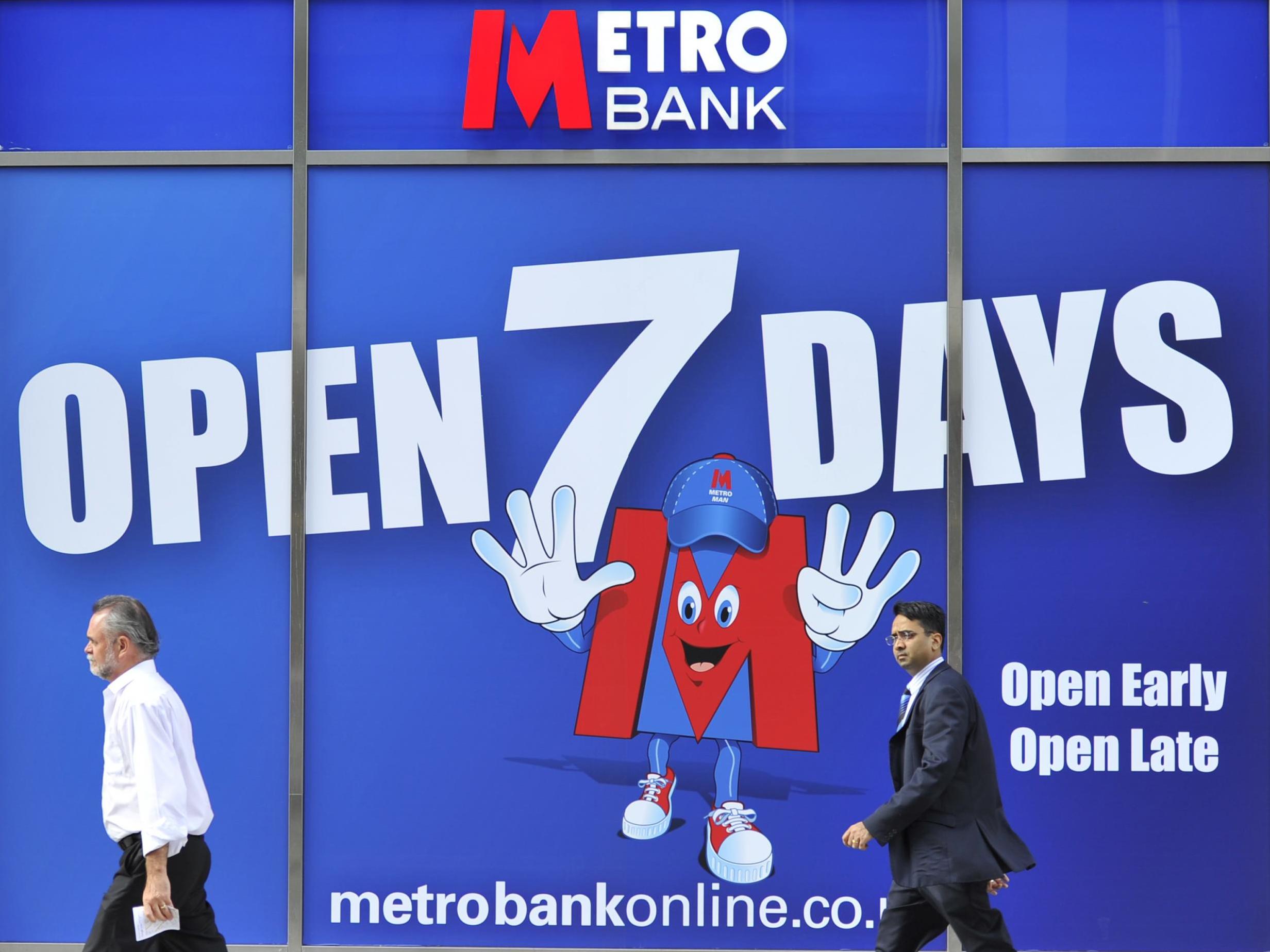Metro Bank should not let recent failures alter its course
The upstart threatens traditional banks’ retail operations, writes Chris Blackhurst, and they do not appreciate it, not one little bit


You can almost hear the squeals of delight emanating from our established banks at the plight befalling Metro Bank, the industry high street disruptor.
Not that the banks would ever publicly admit to taking pleasure in the accounting error that has seen Metro disclose that hundreds of millions of pounds of commercial property loans had been wrongly classified in risk terms, a revelation that caused its shares to crash. At one stage they were down by 50 per cent. They’ve recovered a bit since, but the damage has been done.
Metro’s credibility was further undermined when it became apparent the bank had not spotted the mistake, as first claimed, but instead the regulator was responsible for highlighting the blunder.
The traditional bankers, of course, remain stony-faced – something they’re good at – while in private their smiles are broad. Suddenly, Metro, the interloper with its brightly coloured, ultra-modern, dog-friendly branches, or as it labels them “stores”, and promises of lower costs for its customers, sorry “fans”, as they’re called, does not look so smart.
The jolly, not at all bank-like opening parties with their music, balloons, food and dancing along the street no longer seem so carefree. Metro Bank workers, who the company likes to present as more considerate than their contemporaries at the old rivals, do not look so polished.
Metro has received brickbats before, ever since it sprung onto the British market in 2010, notably over payments to Shirley Hill, the architect wife of the founder and chairman, Vernon Hill.
This, though, is more serious, and the barely suppressed laughter at the incumbents reflects that.
It’s what they’ve been waiting for – proof, as they see it, that Metro is not serious, that it lacks their attention to detail and sense of responsibility. In fact, there is no evidence to suggest that those customers, sorry “fans”, who do not pore over the financial news, are voting with their feet and taking their business elsewhere. So far, it’s not an episode that has damaged Metro’s popular appeal.
Nevertheless, for those bankers who have had to withstand Metro’s charm offensive, and been made to look distinctly stuffy and old-fashioned by comparison, the challenger’s current difficulty is a gift.
Behind the scenes, it will be used to fuel the attacks on Metro, in discreet briefings to politicians, discussions with regulators, the raising of doubts among institutional investors. On the surface, everything may appear civil, but make no mistake, a dirty war is being waged.
Metro threatens the banks’ retail operations, and they do not appreciate it, not one little bit. Theirs is a classic disruptor vs the existing players fight.
Where possible its methods are being aped, so other brands have brightened up their branches. Suddenly, the tired tills have gone, and it’s all about big windows, high-tech machines, gleaming furniture, and accessible, beaming staff. Opening hours have also been extended to match those of Metro.
It’s the same with all challengers. They can expect to be copied, to have their intellectual property replicated, their staff poached, their clients targeted and their names besmirched.

One tech newcomer in financial services once said to me they could not understand why, whenever they entered a foreign arena, the local politicians and media would pose awkward questions about their viability and sustainability. It’s as if someone had gone ahead and briefed against them.
Funny, I said, that is almost certainly exactly what occurred. You’re threatening the very livelihoods of the old guard. They cannot seriously be expected to sit back and let you march in and grab their profits. They will come at you with everything they’ve got, and it will get extremely dirty.
Such struggles are not confined to the advent of technology and its creation of new opportunities. The titanic British Airways vs Virgin contest was all about the fiercely proud BA with its establishment bosses trying to see off the upstart with its bearded, hippie chief. Indeed, Lord King, BA’s late chairman, was once heard to declare his disbelief that anyone would put their faith in Sir Richard Branson, someone who wore a woolly jumper to work. It was simply outside the comprehension of King.
But BA’s defence did not stop at merely querying Branson’s sartorial taste. It was much nastier. Private detectives were hired to uncover anything that may point to Branson’s unsuitability to run an airline. Virgin passengers were approached in an attempt to entice them on to BA flights.
BA allowed itself to become too distracted. It played the man and not the ball, taking its eye off what should have been its response, and raising its game to match, if not better, that of Virgin. Rather than focus on improving its own services, BA paid Virgin the ultimate compliment of obsessing over the fledgling carrier.
Branson, by return, was canny. In private, he knew all too well what BA was doing, and was able, eventually, to show so. In public, he stuck to the cheeky chappy persona, and stressed his belief in supplying friendly touches, warmth, and always putting consumers’ needs first. His resolute approach only served to enrage BA even more.
This is what Metro must do: stick to the knitting, don’t alter, continue to offer a product that is clearly distinct and different. The minute Metro concedes, and moves towards the other banks in approach and style, its raison d’être, its usp, has been diluted, and the contest is lost.
Metro must not let one slip ruin a promising future.
Chris Blackhurst is a former editor of The Independent, and director of C|T|F Partners, the campaigns, strategic, crisis and reputational, communications advisory firm
Join our commenting forum
Join thought-provoking conversations, follow other Independent readers and see their replies
Comments
Bookmark popover
Removed from bookmarks